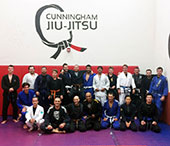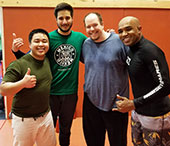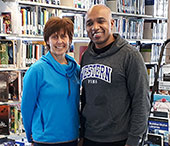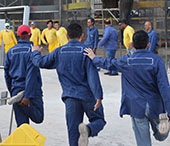FIMS News
Contact Information
FIMS Communications
Becky Blue
Email
519-661-2111x88493
FIMS & Nursing Building
Rm 2060C
Brazilian student finds new friends and family in Canada
January 30, 2019For most Canadians, the martial art Jiu-Jitsu probably conjures up images of hand-to-hand combat, intense competition, or maybe the epic fight scenes portrayed in popular media. What’s less likely to come to mind is how the practice is related to individual health and well-being, and how it creates strong communities that provide their members with friendship and support.
For Alberth Sant'Ana, a Brazilian doctoral student who is spending a year studying in the Faculty of Information and Media Studies at Western University, the focus on health and community that Jiu-Jitsu encourages is relevant in both his personal life and his academic studies.
Sant'Ana has been participating in Jiu-Jitsu since about 2011. A pastime that he has become passionate about, it allows him to focus on his personal health and well-being. As a doctoral student in the Program Graduate of Information Science at the Universidade Federal de Minas Gerais in Belo Horizonte, Brazil, he was also drawn to health and well-being, specifically as it relates to his research into the health information-seeking practices of Brazilian men. Visiting Canada to explore the health information-seeking practices of men in other parts of the world wasn’t a requirement of his schooling, but it was something Sant'Ana was determined to do if at all possible.
"Well, it’s my dream to have an opportunity to live abroad, and to study there. I visited a lot of websites about schools, and when I noticed FIMS, it has a strong program,” he explained.
“I read a lot about the teachers and professors and thought, oh my goodness, it’s there. I think it’s a good program, and city. I sent a message to Professor Jacquie Burkell and she said yes, you can come.”
Sant’Ana’s supervisors in Brazil, Professors Carlos Alberto Ávila Araújo (UFMG) and Wagner Vasconcelos (Fiocruz Brasilia), also believed that it was a great opportunity and encouraged him to go. The trip would provide the chance to create a connection between students and faculty from the Faculty of Information and Media Studies in Canada and students and faculty in the Program Graduate of Information Science in Brazil, hopefully sparking an international discussion about men’s health information.
Sant'Ana was able to secure a government scholarship from the CAPES Foundation through the Brazilian Federal Agency for Support and Evaluation of Graduate Education, as well as time off from his job as a librarian at Instituto Federal de Brasilia, and began making arrangements to travel from Brazil to London, Ontario. Travel logistics and a place to live were concerns, but hardly the only ones. An even more pressing question for Sant'Ana? Does London have a Jiu-Jitsu gym?
“I said okay, I’m going to Canada. Now I need to look for a house. But before a house, I need to look for Jiu-Jitsu. Because I love Jiu-Jitsu,” he explained with a grin. “I found one place. It’s a gym, it’s amazing, it’s really famous here in London. And when I visited it, I loved it because people were friendly. They said, ‘Oh, you’re Brazilian?’”
Sant'Ana was quickly taken in and signed up to take a class, to teach a beginner class, and is able to practice multiple times a week at the gym.
“I love it. My professor in Brazil said, ‘Oh, if you have Jiu-Jitsu, you have a family.’ It’s true. And here I don’t feel alone, I have a family.”
He’s worked equally hard at integrating himself into the FIMS academic community, soaking up as much as he can and making new friends and contacts. Sant'Ana is auditing a number of doctoral-level Library and Information Science and Health Information Science classes, participating in seminars and discussions, and collaborating with other students.
Professor Jacquie Burkell said that, based on his area of study, she felt Sant’Ana would be a great fit to join the Faculty as a visiting student.
“Alberth’s interest in men’s health information practices was a really good fit in FIMS, linking to both our Library and Information Science and Health Information Science programs. There is a really nice synergy, in fact, with a student – Brad Hiebert – who recently defended his PhD in Health Information Science, whose thesis is focused on how rural male farmers access and use health information,” she said.
“Through his courses, he’s enhanced his understanding of the relevant LIS literature – and he has contributed his unique experience and perspective to lively class discussions. I also know that he is helping at least one lucky member of the FIMS community to learn Portuguese.”
Though Sant'Ana is not working for grades, he’s thrown himself into the experience as if he was.
“I just listen and try to give my best. I try to read everything the teachers ask us to read, and I try to do my exercises.”
One class, he said, has really helped him to understand the connection between information, culture and innovation and technology. Other professors and courses have helped him understand more about Canadian health policy and the attitudes and practices of Canadians and Canadian men.
“I want to know more about male behaviours, about how men look for information. Many men live unhealthy lifestyles, eating poorly, or drinking too much alcohol. Some men are reluctant to go to a doctor until they are seriously ill. I know it’s the same in Canada. I want to develop a framework for understanding the complexities involved in men’s health research and practice.”
Sant'Ana will use the information gathered in Canada to inform his academic work when he returns to Brazil. Research that he has already accomplished at home will also factor into the eventual completion of his doctorate. Prior to traveling to Canada, he conducted primary research into the health information-seeking habits of men by putting himself right in their midst.
Understanding that success in interviewing men to gather data for his research would likely rest on his approach, Sant'Ana took a job for three months with a construction company – work that was often difficult and grueling. He felt it was important for him to be one of the men – to experience what they experienced and to live a similar life.
“Many of them are old men. They get up early, work all day, and get back to home late. At home, it’s just eat and sleep, because then another day starts again. It’s a hard life. It’s not a lot of money. And some guys have a lot of children. So it’s a difficult life.”
Sant'Ana worked the job, ate lunch with the men, and immersed himself in the experience. It wasn’t until he had nearly completed his stint with the company that he approached them about possible interviews. His goal was to ask open-ended questions to shed light on the knowledge and habits of the men he had been working with.
“I asked, how is information for you about health? What do you understand? What’s health for you? What are you doing for your life? And some men said, ‘Oh, really? I don’t know.’ So it’s a simple question, but for them it’s really, really complicated.”
Results of the interviews were mixed, with some men being more willing to open up than others. Sant'Ana did succeed in getting many of them to participate in some stretching and warming exercises on the work site, however. And when he announced that he would be leaving to travel to Canada, there were even some tears. Sant’Ana promised them he would return to Brazil and share his experience, and as a parting gift he prepared them a chocolate cake.
“These guys really love chocolate cake.”
Sant'Ana will be staying in Canada until September 2019, at which point he will head home to complete his schooling. His goal is to finish his doctorate within about six months, and then return to his job as a librarian at Instituto Federal de Brasilia.
Back in Brazil, he will of course continue with Jiu-Jitsu, a sport in which he has competed and even won at a high level, though he is reluctant to focus on that aspect of the practice, preferring instead to again highlight the sociability and well-being it provides.
“Because, Jiu-Jitsu for me, it’s not competition. For me it’s connecting to people, it’s friends,” he explained.
His desire to connect with others, and to be open to new experiences and hear others’ stories, ensures that Sant'Ana will return home with new friends not just from his temporary Jiu-jitsu home in London, but also from among the FIMS students, faculty and staff he’s crossed paths with while on his adventure in Canada.







